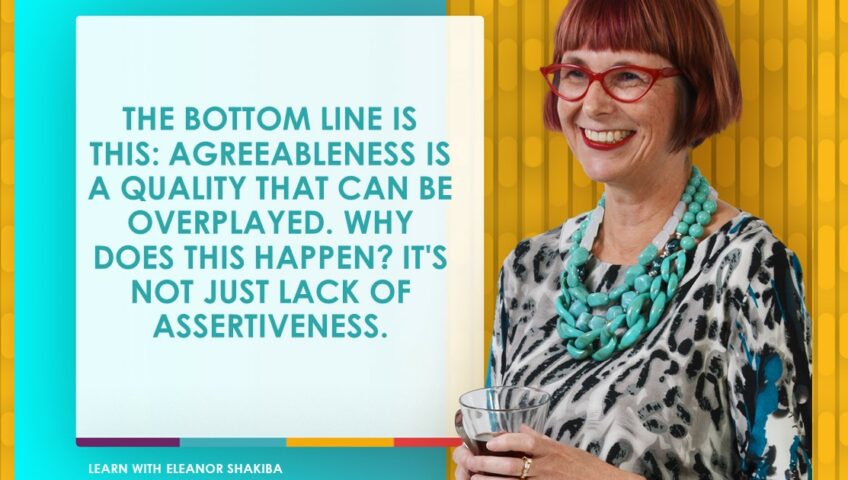Have you ever considered the downside of being “too nice”? Have you ever thought about how your niceness might be having a negative effect on your career or life goals? Sure, being personable and agreeable is important, especially when you need to build rapport. However, being perceived as ‘too nice’ can lead to career stagnation and lack of advancement. This is a problem many women are raising in leadership development sessions these days.
Just how worried should you be about the dangers of being too agreeable? Well, in terms of your career development, I advise you to take it seriously. Here are some examples of how excessive agreeability can negatively impact smart people at work. Let’s start with Marie. She thought it was rude to interrupt, so she let her pushy colleague take over the closing meeting with a potential client. Then her colleague got the credit for the deal Marie had spent six months crafting. Marie lost out because she was too nice to speak up.
The same was true for David. His boss asked David to rewrite a report his colleague had botched. David agreed, although he was sick of stepping in to cover his team-mate’s poor performance. This happened several times. Then his team-mate was promoted over David. When David asked his boss why, he was told that he was ‘not confident enough to lead’. How would you feel in that situation? I’d be pretty peeved, I must say. David was, too.
Free e-book and video tips.Get your copy today!
|
|
Lara’s story shows being too nice happens to self-employed people, too. Her client kept insisting on changes that fell outside the scope of Lara’s freelancing contract. She did the work anyway; despite the fact it took days. She was not paid for this time. Her project was unprofitable. Lara felt stressed, resentful and burned out. All because she was too accommodating to say ‘no’ to an aggressive customer.
Stories like these are all too common. You might even have a few of your own. If that’s the case, you already know that being ‘too nice to speak up’ can stall your career. Here are just five of the consequences it can have:
- Your ideas and opinions aren’t taken seriously
- You are not seen as a leader
- You don’t get the recognition, rewards or promotions you deserve
- People take advantage of your good nature
- You become overwhelmed and burned out
The bottom line is this: agreeableness is a quality that can be overplayed. Why does this happen? It’s not just lack of assertiveness. It’s also social conditioning and the impact of organisational cultures that stress ‘corporate kindness’. Formalising kindness is a great idea, but we also should consider the need for professionals to set limits and boundaries. Otherwise, we risk increasing the number of people who suffer from the mindset I call Chameleon Syndrome.
This is an excessive eagerness to adjust your behaviour, in order to gain acceptance. It is the number one factor keeping women stuck in lower management, as well as a significant contributor to burnout and low morale amongst highly skilled professionals. However, it is possible to break free of this mentality and reclaim your power. If you’d like to find out how, please contact me to book a one-to-one session or arrange training for your leadership team.
This article was created by Eleanor Shakiba
Eleanor is a leadership trainer and success coach. Her mission is inspiring talented people to become leaders who make a difference. Since discovering her passion for training and development, Eleanor has trained more than 60,000 people. She delivers face-to-face workshops for corporates, online masterclasses for leaders and Positive Psychology retreats for trainers, HR practitioners and leaders.

